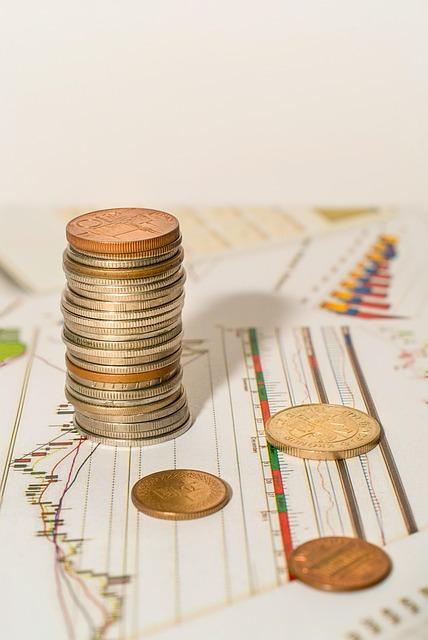Hey there! If the word “economy” makes you think of confusing charts, endless news jargon, or just plain boredom, you’re not alone. But here’s the thing: understanding the economy doesn’t have to be rocket science. Whether you’re curious about why prices go up, what influences jobs, or just want to sound smart at your next dinner party, this guide is here to break down the basics in the simplest way possible. Welcome to “Economy 101: A Simple Guide for Total Newbies” — let’s make sense of all that economic mumbo jumbo together!
Getting to Know the Basics: What Exactly Is the Economy Anyway
Think of the economy as the giant machine where everything we buy, sell, and trade moves around. It’s basically the system that manages how resources like money, goods, and services flow between peopel, businesses, and governments. Whether it’s grabbing a coffee, building a new phone, or even paying for your Netflix subscription, the economy is working behind the scenes to make sure all those transactions happen smoothly. It’s not just about money—it’s about how we all interact to create value and meet each other’s needs.
At its core, the economy is driven by a few simple elements:
- Production: Making products or services.
- Consumption: People using or buying those products and services.
- Distribution: Getting products from creators to consumers.
- Exchange: The actual buying, selling, or trading.
| Key Term | What It Means |
|---|---|
| GDP | The total value of everything produced in a country. |
| Inflation | When prices for goods and services increase over time. |
| Supply & Demand | The balance between how much is available and how much people want. |
| Market | A place or system where buying and selling happen. |

Money Matters Made Easy: Understanding Supply, Demand, and Prices
Imagine walking into a store to buy your favorite coffee mug. The price tag reflects more than just the cost of materials; it’s a snapshot of supply and demand in action. Simply put, when more people want that mug (high demand) but the store has only a few (low supply), the price tends to go up. On the flip side, if the store is overflowing with mugs but few buyers are interested, you might snag it on sale. This push and pull between how much sellers offer and how much buyers want is at the heart of everyday pricing—no economics degree needed!
Here’s a fast rundown of how this works in different scenarios:
- High demand + low supply: Prices increase—think concert tickets or limited-edition sneakers.
- Low demand + high supply: Prices drop—hello,holiday sales and clearance racks.
- Balanced market: Prices stabilize as supply meets demand comfortably.
| Scenario | Supply | Demand | Price Trend |
|---|---|---|---|
| Hot gadget Release | Low | High | Rises |
| Seasonal Clothes Off-Season | High | Low | Drops |
| Everyday Staple Items | Moderate | Moderate | Steady |
How Governments and Banks Play Their Part in the economy
At the heart of any economy are the actions taken by governments and banks, both playing crucial roles to keep things running smoothly. Governments set the rules of the game—they decide on taxes, spending, and regulations that impact how businesses and consumers behave. For example, by adjusting taxes or increasing public spending on infrastructure, a government can encourage more economic activity, create jobs, or curb inflation when prices rise too fast. On the flip side, if things get shaky, they can also tighten the purse strings to prevent the economy from overheating.
Banks, meanwhile, act like the economy’s fuel stations, providing the money businesses and people need to grow and spend.They control how easily loans and credit are available, which in turn influences how much money is circulating. Here’s a quick peek at their main roles:
- Central Banks: Manage national money supply and interest rates to keep inflation and unemployment in check.
- Commercial Banks: Offer loans, savings accounts, and financial services that help businesses expand and consumers spend.
- Regulators: Ensure banks follow rules to keep the financial system safe and sound.
| Role | Action | Economic Effect |
|---|---|---|
| government | Spending on public projects | Boosts job creation and demand |
| Central Bank | Lowering interest rates | Encourages borrowing and investment |
| Commercial Banks | Providing mortgages | Supports housing market growth |
Smart Moves for Your Wallet: Simple Tips to Grow Your money
Building up your savings doesn’t have to be rocket science. Start by tracking where your money goes each month—this simple step can reveal hidden spending habits that quietly drain your wallet. Once you know the flow, set realistic monthly goals to cut unnecessary expenses and redirect that cash into a savings or investment account. Remember,even small amounts add up over time.Think of it like planting seeds; consistent care today leads to a flourishing garden tomorrow.
Another savvy move is to diversify how your money works for you. Instead of stashing all your funds in a low-interest savings account, explore options like high-yield savings accounts, index funds, or retirement plans with employer matches. Here’s a quick cheat sheet to get you started:
| Option | Risk Level | Expected Returns | Best for |
|---|---|---|---|
| High-Yield Savings | Low | 1-2% | Emergency fund |
| Index Funds | Medium | 7-10% | Long-term growth |
| Retirement Plans | Varies | 5-8% | Tax benefits & future security |
- automate your savings: set it and forget it to avoid temptation.
- Track progress monthly: celebrate small wins to stay motivated.
- keep learning: smart money choices come from understanding basic concepts.
Why Keeping Up with Economic News Can Make You a Better Spender
Keeping an eye on economic developments isn’t just for Wall Street pros—it can seriously boost your everyday spending game.When you know whether inflation is creeping up or interest rates are dropping, you can make smarter decisions about everything from when to buy a new gadget to how to plan your monthly budget.For instance, understanding that prices are rising might push you to prioritize essentials over splurges or hunt for better deals before costs go up. Plus, staying informed can help you avoid common pitfalls like locking into high-interest loans when rates are expected to fall.
Becoming a savvy spender involves more than just tracking prices—it’s about reading the economic signals that affect your wallet. Here’s what tuning into the news can reveal:
- Inflation trends: Spot when your money’s buying power might shrink.
- Employment data: Gauge job market health and your earning potential.
- consumer confidence: Helps you understand spending patterns and market moods.
- Interest rate moves: Determine the best times to borrow or save.
| Economic Indicator | How It Affects Your Spending |
|---|---|
| Inflation Rate ↑ | Buy essentials early; expect price hikes |
| Interest Rates ↓ | Consider loans or big purchases |
| Consumer Confidence ↑ | Feel more comfortable spending |
| Job Market strength | Plan for raises or savings adjustments |
Q&A
Economy 101: A simple Guide for Total Newbies – Q&A
Q: What exactly is the economy?
A: Think of the economy as the big, busy marketplace where everyone’s buying, selling, working, and spending money. It’s all about how goods and services move around, how people earn their cash, and how companies make profits. Basically, it’s the zoomed-out picture of money flow in a country—or even the whole world!
Q: Why should I even care about the economy?
A: Because the economy affects your day-to-day life more than you might realize. It influences job availability, prices at the grocery store, how expensive your rent is, and even if your favorite coffee shop stays open. Knowing a bit about it helps you make smarter money choices and understand the news better.
Q: What’s GDP, and why do people keep talking about it?
A: GDP stands for Gross Domestic Product. It’s like the economy’s report card showing how much stuff (goods and services) a country produces in a year.If GDP is growing, the economy’s doing well; if it’s shrinking, things might be a bit rocky. It’s one of the main ways economists check if the economy’s healthy.
Q: Wait, what’s inflation? Is it bad?
A: Inflation means prices going up over time. So, your $5 latte might cost $5.25 next year. A little bit of inflation is normal and even healthy—it means the economy is growing. Too much inflation? Not great, because your money doesn’t stretch as far. Too little or negative inflation (deflation) can also be a problem. It’s a balancing act!
Q: What’s the difference between a recession and a depression?
A: Both are periods when the economy is in trouble, but a recession is shorter and less severe—a bit like a cold. A depression is much deeper and longer-lasting, kind of like the flu with complications. Thankfully,depressions are rare!
Q: Why do governments and central banks mess with interest rates?
A: Interest rates influence how expensive it is to borrow money. If rates are low, people and businesses borrow and spend more, which can boost the economy. If rates are high, borrowing slows down, cooling off spending and inflation.Central banks tweak rates to keep everything stable and growing steadily.
Q: How do jobs fit into all this economy stuff?
A: Jobs are crucial! More jobs mean more people earning and spending money,which drives the economy forward. When unemployment is low, that’s usually a good sign. High unemployment? Not so much—it means people are struggling to find work, and the economy might be in a slump.
Q: Can I be smart about the economy without being an expert?
A: Absolutely! You don’t need to memorize economics textbooks.Just paying attention to simple things like inflation headlines, job reports, or price changes can help you understand the economy’s vibe.And honestly, even knowing basic terms like GDP or interest rates puts you ahead of a lot of folks!
Q: Any quick tips for newbies wanting to learn more?
A: Start small: follow friendly blogs (like this one 😉), watch videos that break things down, or listen to podcasts that explain economic news in plain English. Ask questions, stay curious, and don’t stress about the jargon. The economy is complicated, but understanding its basics is totally doable!
Hope this Q&A made the economy feel a bit less intimidating. Got more questions? Drop them in the comments—I’m here to help!
Wrapping Up
And there you have it—a super simple rundown of the economy that anyone can understand! Remember, you don’t need to be a finance whiz to grasp how money moves, businesses grow, or why prices go up and down. Economy 101 is all about getting comfortable with the basics, so you can make smarter choices and maybe even impress a few friends with your newfound knowledge. Stay curious, keep asking questions, and before you know it, you’ll be navigating the economic world like a pro. Until next time, happy learning!











